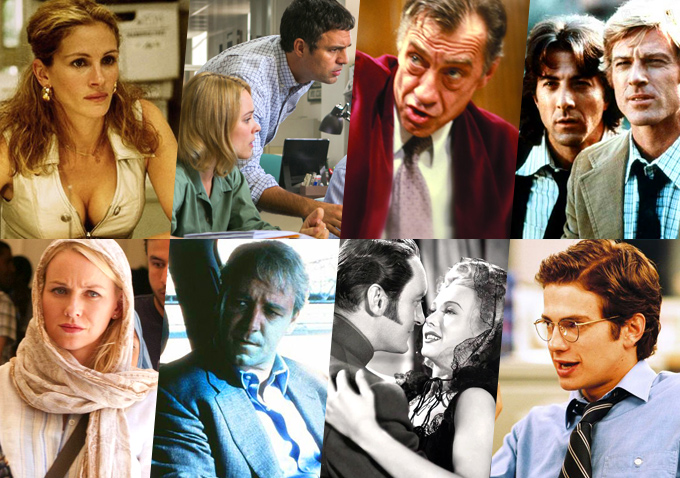
“Erin Brockovich” (2000)
One only has to look at the kind of films that followed in the wake of “Erin Brockovich” —“North Country” or “Conviction,” to name two— and it becomes swiftly apparent how middle-of-the-road it could have been, and what a terrific job that writer Susannah Grant and director Steven Soderbergh did in making it a movie that’s anything but. Released in the middle of Soderbergh’s stellar turn-of-the-century run (he was nominated for an Oscar for Best Director twice that year, winning for “Traffic”), the film tells the story of the title character (Julia Roberts, who also won Best Actress), a colorfully profane single mother who begins working in the office of an attorney and ends up uncovering an environmental poisoning and cover-up by the Pacific Gas & Electric Company that leads to a giant class action lawsuit. It’s an empowering, deeply feminist story that suggests that these people wouldn’t have gotten justice without the perseverance and persistence of Brockovich, and smartly focuses on the nuts and bolts of legal work rather than forcing the movie into an ill-fitting courtroom drama mould. The outcome is rarely in doubt, particularly with Roberts in such dazzling movie-star form (while adding a grit and nuance that we don’t always see), but it still feels deeply earned when it comes. And Soderbergh gives a theoretically conventional story a languid indie charm, somewhere between Hal Ashby and Jonathan Demme, that makes the film even more winning.
https://www.youtube.com/watch?v=HCQGydFK_hM
“Fair Game” (2010)
A now-rare foray into non-blockbuster territory for “The Bourne Identity” and “Edge Of Tomorrow” director Doug Liman, “Fair Game” got lost in the midst of both a Cannes premiere and Oscar season. But it’s worth a second look: it’s a sincere, smart take on one of the most shocking abuses of power perpetrated by presidential administration in history, second only to the Watergate scandal in modern times. Based on books by the two subjects of the film, and written by “Spectre” writer Jez Butterworth and his brother John-Henry, it tells the story of how undercover CIA agent Valerie Plame (Naomi Watts) was outed by State Department officials (Bush administration adviser I. Lewis “Scooter” Libby also played a significant role as such) as retribution for her diplomat husband Joseph Wilson (Sean Penn) speaking out against the intelligence on the war in Iraq. It’s smart and authentic, though a little eager to press the melodrama button in places. And it’s an odd fit for Liman: his trademark looseness and smart visual sense isn’t a skillset particularly well catered to by this material. But his clear, indelible anger that his government would throw one of their own under the bus in this manner gives the film a real momentum, and Watts is especially good as Plame, while even those of us with little time for Penn have to acknowledge that he gives a textured and impassioned turn here.

“Hollywoodland” (2006)
Allen Coulter‘s unjustly overlooked film concerns tragedy, thwarted ambition, sexual jealousy and hypocrisy in the Golden Age of the Hollywood studio system. Starring Diane Lane, Ben Affleck, Bob Hoskins and Adrien Brody (with Brody’s gumshoe character being the only one not based on a real person), “Hollywoodland” explores the mysterious nature of the death of George Reeves (Affleck), the erstwhile 1950s TV Superman and lover of studio fixer Eddie Mannix’s wife Toni (Lane). Evoking a milieu in which the glamor and gloss of Hollywood conceal rot beneath, Coulter, who has subsequently worked more in TV (“Boardwalk Empire“) tells the story of Reeves’ apparent suicide by gunshot in his bedroom while a soiree went on below. The official verdict was that it was self-inflicted, but many contemporaries assumed murder and the interference and/or manipulation (at least) of Mannix (Hoskins), a character so fascinating he’ll also pop up in the Coen Brothers‘ forthcoming “Hail Caesar!” As this week’s edition of excellent podcast You Must Remember This, which is dedicated to Mannix, points out, Coulter’s film, unlike “The Cat’s Meow,” does not attempt a definitive explanation of questionable events, but instead ambivalently presents the various competing theories as possibilities, and in so doing adds to the aura of mystery that still shrouds this tamped-down Hollywood scandal.

“The Insider” (1999)
A brilliant, uncompromisingly complex and absorbing account of the circumstances leading to tobacco industry whistleblower Jeffrey Wigand‘s (Russell Crowe) controversial “60 Minutes” interview, Michael Mann‘s “The Insider” is perhaps the definition of an unsexy subject made thrilling through exceptional filmmaking. Featuring one of Crowe’s best turns, evoking the loneliness, egotism, and insecurity common to whistleblowers better than maybe any other single performance, it pits him opposite a similarly top-flight Al Pacino as “60 Minutes” producer Lowell Bergman. What’s so fascinating about Mann’s approach, and that of co-writer Eric Roth, is that the film becomes as much about the corruption, self-interest, and double-dealing within CBS, within various state governances and within the press at large as it is about nasty old Big Tobacco and the lengths it’ll go to to keep their lies under wraps. Yet despite all these massive mechanisms bearing down, Mann never loses sight of the men at the heart of the story, who display a kind of heroism we rarely see explored in movies —the kind that knows it’s not simply about “doing the right thing” but about choosing just which ethical, moral and personal sacrifices you’re willing to make in order to see justice done. The kind that functions in the real world. “The Insider,” shot through with melancholy and a kind of tired, resigned wisdom, is unusual for being the story of a deserved, hard-earned triumph that was a long time coming, yet feels anything but triumphalist.






Silkwood is a worthy addition (as The Insider and Erin Brockovich are included), Reversal of Fortune would make an honourable mention (in a Douglas Sirk sort of way), and Patty Hearst – as it\’s a strange and odd story, if not great/brilliant – but absorbing.